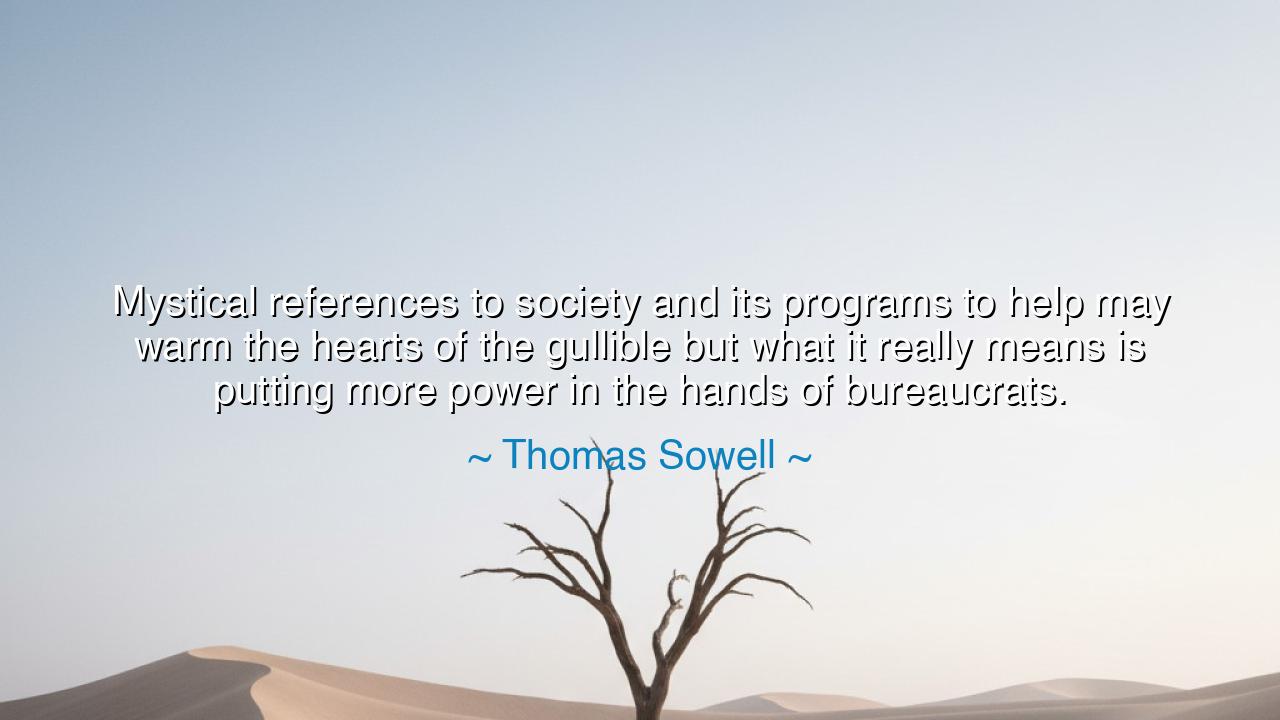
Mystical references to society and its programs to help may warm
Mystical references to society and its programs to help may warm the hearts of the gullible but what it really means is putting more power in the hands of bureaucrats.






Hearken, O seekers of wisdom, to the words of Thomas Sowell, sharp as a blade and clear as mountain air: “Mystical references to society and its programs to help may warm the hearts of the gullible but what it really means is putting more power in the hands of bureaucrats.” This saying is no mere complaint but a warning, born of long observation of the affairs of nations. For Sowell reveals to us the danger of illusion—the comfort of grand words that mask the reality of power. When rulers speak of society, they may adorn their speech with noble phrases, but behind the veil lies the machinery of control, where decisions are taken not by the people themselves, but by distant bureaucrats.
In every age, those who seek power have cloaked themselves in noble language. Kings of old claimed divine right to protect their people, yet their decrees often served their own glory. Emperors promised peace and stability, yet demanded obedience that crushed the spirit. So too, in our own times, men in offices speak of programs to “uplift” or to “support” the masses. Yet Sowell unmasks the truth: these programs, unless checked by vigilance, often become the instruments by which ordinary men surrender their freedom, little by little, into the hands of an unaccountable few.
History gives us many lessons. Consider the tale of the Soviet Union. With fiery words, its leaders promised equality and justice for all, declaring that the people would finally be free from exploitation. But what came to pass? Power slipped not into the hands of the people, but into the grasp of a vast bureaucracy, unfeeling and unreachable. Citizens stood in endless lines for bread, while those who governed lived in privilege. The words of compassion for “society” became tools of oppression, and the mystical promise of fairness concealed the cold hand of control.
Yet Sowell does not speak these words to cast aside all efforts of compassion. Rather, he warns us that good intentions, when clothed in vague speech and centralized power, often lead to chains instead of liberty. A helping hand should come not from faceless authority, but from the living bonds of family, community, and voluntary charity. The gullible heart, soothed by fine promises, must awaken and see that true care cannot be delivered by bureaucracy alone. For when compassion is commanded by law and carried out by officials, it risks becoming not love, but mere administration.
The wisdom here is sharp but just: beware of mystical references that promise what they cannot deliver. For real society is not an abstraction; it is the neighbor, the worker, the friend, the family. Programs may aid, but they must never replace the living fabric of responsibility and human connection. When government grows too vast, when bureaucrats wield more power than the people themselves, liberty is weakened, and dependence grows like a shadow.
What, then, is the lesson for us who live in this age? It is this: question the noble phrases, examine the promises, and look beyond the veil of comforting words. Ask always: who gains the power? Who makes the decisions? And who bears the cost? Support aid that empowers individuals rather than enslaves them to distant systems. Build strong communities that can stand without leaning wholly upon bureaucracy. Let your compassion be living, not abstract—your hand reaching directly to those in need, not through the endless corridors of faceless power.
Therefore remember the wisdom of Sowell: programs that sound mystical may soothe the ears, but true freedom demands clarity and vigilance. Do not surrender liberty for the illusion of care. Instead, be strong, be discerning, and nurture the bonds of society at its root, not through the grasp of bureaucracy, but through the living strength of free and responsible men and women. In this way, compassion will be real, freedom will endure, and power will remain where it belongs—within the hands of the people.






AAdministratorAdministrator
Welcome, honored guests. Please leave a comment, we will respond soon